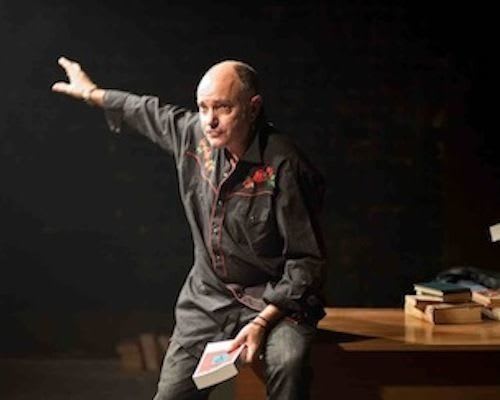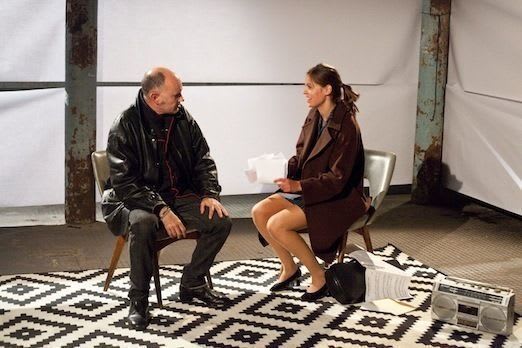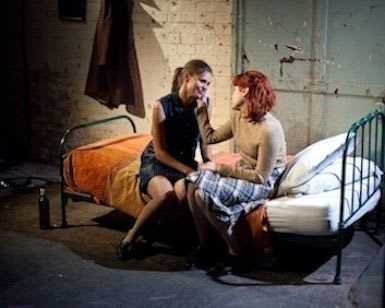East Berlin, 1985: An aging English rock star fleeing his responsibilities in the UK takes shelter in the unlikeliest of places—behind the wall. Once there, he meets three women, each of whose lives are forever changed by his presence.
Not a bad start.
Ciaran McConville’s Heaven in Berlin, mounted at Battersea’s Testbed1 by Hobo Theatre, is nothing if not full of promise.
As the story unfolds, the audience roams from scene to scene in a hazy warehouse space, accompanied by guitarist Ollie Pash’s evocative electric soundscape. With eighties licks from Klaus Nomi, Iggy Pop and David Bowie and the dark, bunker-like atmosphere, there’s an ethereal, other-worldly feel to the setting—we’re occupying a remembered version of life behind the Iron Curtain, complete with ghosts.
Soon after arriving in Berlin, Brian meets Greta, a single mom ready for a new start. While Greta’s character occupies the periphery of the story, her daughter Judi and Brian’s building concierge Ida have far richer stories and experiences to offer. Ultimately, Heaven in Berlin reads more like their journey than the guitarist’s.
Judi, a young violin virtuoso, develops a strong connection with Ida, leading to her seventeen-year-old coming of age. For her part, Ida is returning to the city after involuntary confinement to a mental institution, the state-decreed punishment for her attempt to escape East Berlin.
Where Heaven in Berlin falls down is in the follow-through of stories introduced off the top. In Act 2, we never really get to the bottom of who the characters are, particularly Brian, and McConville takes some jarring shortcuts to reach the play’s end.
Also, there are a few moments in this act where the dialogue telegraphs Heaven in Berlin’s themes. Two back-to-back scenes have characters describing the irony of the situation they’re in. As an audience, we need to be given more credit.
Nonetheless, director Jamie Harper’s staging of the play cleverly evokes life under constant surveillance; as the audience travels from one scene to the next, trench-coat clad government informants are busy recording every conversation. As well, officious young office workers, clearly Karl-Heinz Drews’s minions, busily race past spectators through the space.
In terms of acting, Heaven in Berlin is uneven. As the violin prodigy Judi, Heather Nimmo solidly charts the character’s journey from sarcastic teenager to independent woman. Boris Mitkove is also very strong. Playing Brian’s son Mark, he captures the free-falling state of an adult-child essentially turned orphan.
As Brian, Ian Bailey is good in Act I, making the most of the character’s humour; nonetheless, Bailey is saddled by some narrative leaps in the second act and doesn’t always fully flesh-out the middle-aged rock star. Ida Bonnast also demonstrates clear chops off the top but her character is written with less specificity in the second act, functioning more like a device to drive the narrative than the passionate young artist encountered at the out-set.
Thanks to Fridthjofur Thorsteinsson’s lighting, Heaven seems close a hand when we join the characters in confronting the wall and their personal demons at the play’s conclusion.
I couldn’t help but wonder, though: if we create Heaven-on-earth through our art, why does Judi’s violin remain silent throughout?


